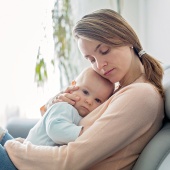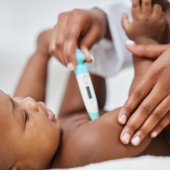Here we look at the symptoms and causes of diarrhoea and vomiting in babies and young children, and when to seek medical advice.
It's normal for babies and toddlers to have diarrhoea and to vomit occasionally. In most cases it isn't a sign of anything serious. It's usually caused by an infection like gastroenteritis, also known as a stomach or tummy bug (NHS Choices, 2018a)
Most babies and toddlers who have diarrhoea and vomiting don't need medical treatment. That means you can safely look after them at home (NHS Choices, 2018a).
Trust your instincts – if your baby also has a very high temperature or is showing signs of dehydration, contact your GP or 111 for medical advice (NHS Choices, 2017a). Make sure you know the signs of serious conditions such as meningitis, which can develop rapidly and is a medical emergency.
What causes diarrhoea and vomiting in babies and toddlers?
Gastroenteritis is the most common cause of vomiting and diarrhoea in babies and young children. Gastroenteritis is an infection of the gut usually caused by a virus or bacteria.
The symptoms can be unpleasant but your child will usually start to feel better after a few days (NHS Choices, 2018a).
Vomiting usually lasts for one to two days and stops within three days. Diarrhoea usually lasts for five to seven days and in most cases stops within two weeks (NICE, 2009).
Other causes of vomiting in babies
In some cases, vomiting might be a sign of something other than gastroenteritis and in rare cases could be a sign of a serious illness.
In babies, the cause of diarrhoea and vomiting could also be swallowing air during feeding, a milk intolerance or reflux (NHS Choices, 2018a).
In older children, food allergies can cause vomiting in children (NHS Choices, 2018a). Food allergies can also cause other symptoms, such as a raised, red, itchy skin rash (urticaria) and swelling. The swelling will affect the face, around the eyes, lips, tongue or the roof of the mouth.
Vomiting can sometimes be a sign of other infections such as urinary tract infections (UTIs), middle ear infections, pneumonia or meningitis (NHS Choices, 2018a). Contact your GP if your child is vomiting and has other signs of infection like a high temperature (fever) and irritability.
Appendicitis can cause vomiting. This is a painful swelling of the appendix, which causes severe stomach pain (NHS Choices, 2018b). If your child has tummy pain that's gradually getting worse, contact your GP or NHS 111 immediately. You should call 999 for an ambulance if they have pain that gets worse quickly and spreads across their tummy.
Accidentally swallowing something poisonous can cause your child to vomit. If you think they have swallowed something dangerous like medicine, chemicals or button batteries, act quickly to get them to your nearest emergency (A&E) department (NHS Choices, 2017b). Take the medicine or packaging with you.
What should I do if my baby is vomiting and has diarrhoea?
You know what’s different or worrying behaviour for your child. If you are worried or have concerns, talk to your GP or seek urgent medical advice (NHS Choices, 2017a).
With the common symptoms of gastroenteritis, you can usually take care of your child at home by making sure they stay hydrated and get plenty of rest (NHS Choices, 2018a). Read more in our article about caring for a child with diarrhoea and vomiting.
Get medical advice urgently if your baby or toddler
- Is under eight weeks old and you're very worried about them.
- Has vomiting that lasts longer than one to two days, or diarrhoea lasting longer than five to seven days, or they're showing signs of dehydration.
- Seems to be deteriorating rather than getting better.
- Has a temperature of over 38°C for a baby less than three months old, or a temperature over 39°C for a baby aged three to six months old.
- Has blood or mucus in their poo.
- Has bile-stained (green) vomit or it contains blood.
- Has severe abdominal pain.
- Is vomiting constantly and can't keep down fluids.
- Is vomiting and develops sudden and severe tummy pain, or they're floppy, irritable or less responsive.
- If they're vomiting and have a headache, stiff neck and a rash.
- If you think they might be getting dehydrated. Dehydration can be serious in babies and young children.
(NICE, 2009; NHS Choices, 2017a, 2018a)
Children at higher risk of dehydration
- Children younger than one year, particularly those younger than six months.
- Infants who were of low birth weight.
- Children who have had more than five bouts of diarrhoea in the previous 24 hours.
- Children who have vomited more than twice in the previous 24 hours.
- Children who have not been offered or have not been able to tolerate supplementary fluids.
- Infants who usually breastfeed and have stopped breastfeeding during the illness.
- Children with signs of malnutrition.
(NICE, 2009)
Signs of dehydration
- Appearing to get more unwell.
- Changing responsiveness, for example, irritability or lethargy.
- Decreased urine output – few or no wet nappies.
- Pale or mottled skin.
- Cold extremities.
(NICE, 2009)
Dehydration can be very serious, especially in young babies. Read our article about dehydration here.
If your baby or child has a tummy bug and they are staying hydrated, you should be able to look after them at home.
If you’re worried about any symptoms your child has, talk to your GP, call 111 for advice or in a medical emergency call 999. Check with your GP before going in for an appointment. They might suggest a phone check-up to help prevent spreading the infection.
This page was last reviewed in April 2018.
Further information
Our support line offers practical and emotional support with feeding your baby and general enquiries for parents, members and volunteers: 0300 330 0700.
You might find attending one of our NCT New Baby courses helpful as they give you the opportunity to explore different approaches to important parenting issues with a qualified group leader and other new parents in your area.
NHS Choices has useful information about diarrhoea and vomiting.
NHS. (2017) Does your child have a serious illness? Available from: https://www.nhs.uk/conditions/pregnancy-and-baby/spotting-signs-serious-illness/#signs-of-serious-illness-in-a-baby-or-toddler [Accessed 15th April 2018]
NHS. (2017b) What to do if your child has an accident. Available from: https://www.nhs.uk/conditions/pregnancy-and-baby/accidents-what-to-do/#if-a-child-has-swallowed-a-poisonous-substance [Accessed 15th April 2018]
NHS. (2018a) Diarrhoea and vomiting. Available from: https://www.nhs.uk/conditions/pregnancy-and-baby/diarrhoea-vomiting-children/ [Accessed 15th April 2018]
NHS Choices. (2018b) Appendicitis. Available from: https://www.nhs.uk/conditions/Appendicitis/ [Accessed 15th April 2018]
NICE. (2009) Diarrhoea and vomiting in children - Diarrhoea and vomiting caused by gastroenteritis: diagnosis, assessment and management in children younger than 5 years. Available from: https://www.rcpch.ac.uk/sites/default/files/asset_library/Research/Clinical%20Effectiveness/Endorsed%20guidelines/Diarrhoea%20and%20Vomiting%20Under%205%20%28NICE%29/Diarrhoea_and_vomiting_under_5.NICE_guideline%5B1%5D.pdf [Accessed 15th April 2018]







